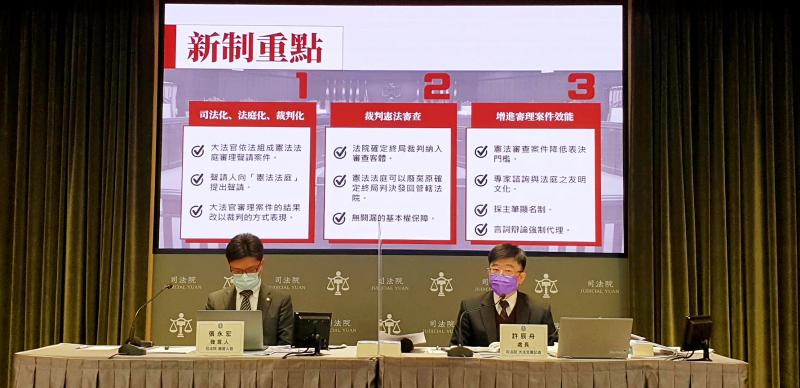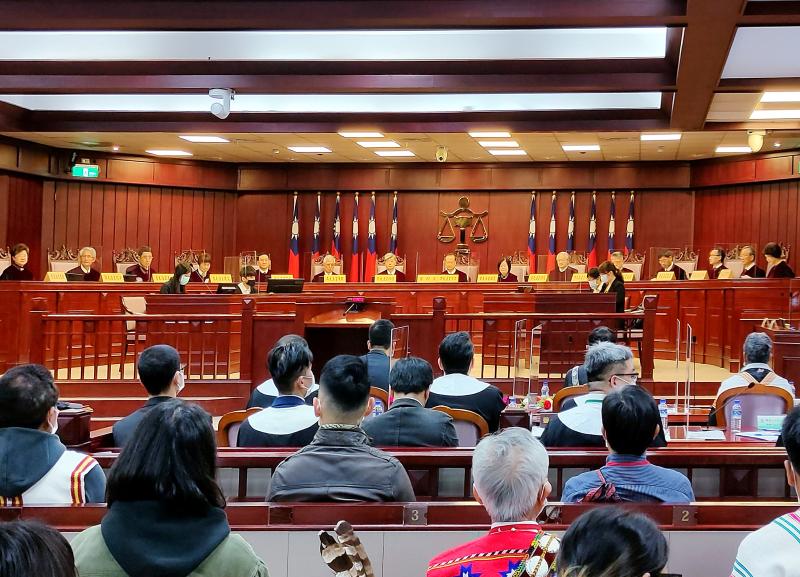The Constitutional Court Procedure Act takes effect today, replacing the Constitutional Interpretation Procedure Act, making Interpretation No. 813 the last Judicial Yuan interpretation. Taiwan’s system of constitutional interpretations, implemented 73 years ago, has come to an end.
Under the new system, a constitutional court comprised of 15 Grand Justices will replace the Council of Grand Justices of the old system. The new courts will hear constitutional litigation with a procedure similar to that of court proceedings, and decisions will be now known as judgements, rather than interpretations.
The difference between the old and the new system is that in addition to examining whether a law or regulation is unconstitutional, it can also examine whether a judgement itself is unconstitutional. According to the Judicial Yuan, people who believe that the laws applied in a ruling or the ruling itself are unconstitutional can apply for a review within six months of receiving the ruling.

Photo: Yang Kuo-wen, Liberty Times 照片:自由時報記者楊國文
The purpose of the new constitutional litigation system is to improve Taiwan’s constitutional review system, said Hsu Chen-chou, Chief Justice Clerk of the Judicial Yuan. The object of the constitutional review by the Grand Justices has now expanded to include the final decisions, along with the existing review of the constitutionality of law and regulations, hoping to better protect people’s rights compared to the former system.
With a total of 95 articles, the Constitutional Court Procedure Act includes many major changes, such as the introduction of the “constitutional complaint concerning a judgment” adopted from the German system, lowering the voting threshold for constitutional review cases, and allowing for the court to make public the claims it receives, in the public interest.
Another innovative change is to refer to the US Supreme Court’s amicus curiae provision, in which any person, authority or association, other than the parties involved, who considers themselves having an interest in a case pending before the Constitutional Court, may make a motion to the court to serve as an amicus curiae and appoint a representative to provide expert opinion of reference value to the court.

Photo: Wu Cheng-feng, Liberty Times 照片:自由時報記者吳政峰
(Translated by Lin Lee-kai, Taipei Times)
《憲法訴訟法》於今日正式實施,取代原本的《大法官審理案件法》,為施行七十三年的釋憲制度畫下句點,釋字八一三號解釋成為大法官最後一號解釋。
此新制是由司法院十五位大法官組成「憲法法庭」,取代之前的「大法官會議」,讓審理程序全面司法化、法庭化,以裁判方式宣示或公告審理結果。
新舊制不同處是除審查是否違憲,還可以審查確定裁判是否違憲。司法院指出,民眾若認為確定判決適用法律、或裁判本身違憲,應在收受判決後六個月內提出聲請。
司法院大法官書記處長許辰舟指出,憲法訴訟新制的目的,是要完善我國的憲法審查制度,大法官憲法審查的客體,從原本的法律、命令,藉由新制,擴及法院確定判決,盼帶給民眾短缺漏的基本權保障。
《憲法訴訟法》共有九十五個條文,其中有多項重大變革,例如參考德國引進「裁判憲法審查」制度,同時調降憲法審查案件表決門檻、主動公開受理案件的聲請書,兼顧民眾知的權益。
另一項創新規定,是參考美國聯邦最高法院「法庭之友」(amicus curiae)立法例,由當事人以外的人民、機關或團體,得主動以書面敘明其與憲法法庭審理案件的關聯性,獲裁定許可成為法庭之友後,委任代理人提出具參考價值的專業意見,供法庭審理參考。
(自由時報記者楊國文)

It’s likely that you may know someone who has had their appendix removed, or at least you’ve heard of the operation. An appendectomy is typically performed when the appendix, a small pouch next to the intestines, becomes inflamed or infected, leading to severe pain and potential complications if left untreated. Fortunately, the procedure is very safe today, and patients can go on to live normal lives without their appendix. Yet, it still begs the question of how humans can continue living without an organ. The human body is full of various parts that scientists still don’t completely understand, and

Wisdom teeth are another example of vestigial organs. Why do humans have wisdom teeth? One theory suggests that they were originally intended to help support muscles and tissues in the human face. Another theory indicates that they were initially meant to aid our ancestors in chewing certain tough foods that grew in the wild. As our diets have softened with processed foods, these teeth may become less necessary. Removing one’s wisdom teeth can feel like a rite of passage for many young adults. At some point in their late teens to early twenties, most people will have up to

Despite being thoroughly prepared for the coming exam, Sarah couldn’t stop herself from thinking about what could go wrong on test day. So, she kept studying her textbooks again and again. Do you often find yourself caught in this same type of loop, endlessly thinking about scenarios? If so, you’re likely struggling with a common challenge: overthinking. Overthinking is a phenomenon in which individuals become trapped in a tangle of worries, continuously replaying past events in their mind or feeling uneasy about what the future holds. It’s like being stuck in a never-ending loop of negative thoughts that can prove challenging

Ford Motor Co. says it will reduce its workforce by 4,000 in Europe and the UK by the end of 2027, citing headwinds from the economy and pressure from increased competition and weaker than expected sales of electric cars. Ford said Wednesday last week most of the job cuts would come in Germany and would be carried out in consultation with employee representatives. Of the total, 2,900 jobs would be lost in Germany, 800 in Britain and 300 in other European Union countries. Ford has 28,000 employees in Europe, and 174,000 worldwide. “The global auto industry continues to be in a period of